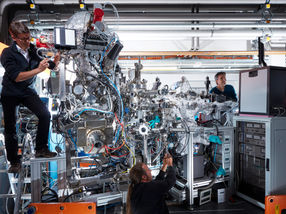'Heroes of Chemistry': Developed new drugs and technology to cut heating and cooling bills
Advertisement
The scientists behind three inventions that touch the lives of millions of people around the world will be inducted into a coveted scientific "Hall of Fame" as the latest Heroes of Chemistry named by the American Chemical Society (ACS. The ceremony, held at the 244th ACS National Meeting & Exposition will confer public recognition on scientific teams that developed:
- The first oral drug for the most common and difficult-to-treat form of chronic hepatitis C, which infects more than 3 million people in the United States and 130-170 million worldwide.
- Another new medicine for one form of adult leukemia that provided patients with an alternative treatment when the disease became drug-resistant.
- The process, used around the world, for making "low-e window glass" and other glass coatings that saves millions of dollars each year in heating and cooling costs and significantly lowers energy consumption.
Established in 1996, the ACS Heroes of Chemistry program recognizes scientists whose work in various fields of chemistry and chemical engineering has led to the successful innovation and development of commercial products that benefit humankind.
Scientists from Merck, known as MSD outside the United States and Canada, won the honor for developing the chronic hepatitis C drug Victrelis® (boceprevir). They are Ashok Arasappan, Ph.D.; Frank Bennett, Ph.D.; Stéphane Bogen, Ph.D.; F. George Njoroge, Ph.D.; and Srikanth Venkatraman, Ph.D.
Victrelis® was the first oral hepatitis C virus protease inhibitor approved by the U.S. Food and Drug Administration for use in combination with pegylated interferon alfa and ribavirin, to treat the most common type of chronic hepatitis C. Chronic hepatitis C is a viral infection that affects more than 130-170 million people worldwide and can cause serious liver damage.
Scientists from Novartis won the honor for developing the leukemia drug Tasigna® (nilotinib). They are Paul Manley, Ph.D.; Gabriele Fendrich, Ph.D.; Werner Breitenstein, Ph.D.; and Sandra Jacob, Ph.D. Tasigna® is a prescription medication for adults with newly diagnosed form of Philadelphia chromosome-positive chronic myeloid leukemia and for patients who are resistant or intolerant to previous treatment.
Scientists from Arkema, Inc., a global producer of industrial chemicals won the honor for developing atmospheric pressure chemical vapor deposition technology. They are Dave Russo, Ph.D.; Jeff Stricker, Ph.D.; Georg Lindner; Jeremy Nihart; Ryan Smith, Ph.D.; Connie Lo; Jing Ming Mai; and Clem McKown. The technology deposits coatings of various chemicals onto the surface of glass, providing significantly increased solar heat gain control.
Most read news
Organizations
Other news from the department science

Get the chemical industry in your inbox
By submitting this form you agree that LUMITOS AG will send you the newsletter(s) selected above by email. Your data will not be passed on to third parties. Your data will be stored and processed in accordance with our data protection regulations. LUMITOS may contact you by email for the purpose of advertising or market and opinion surveys. You can revoke your consent at any time without giving reasons to LUMITOS AG, Ernst-Augustin-Str. 2, 12489 Berlin, Germany or by e-mail at revoke@lumitos.com with effect for the future. In addition, each email contains a link to unsubscribe from the corresponding newsletter.































































